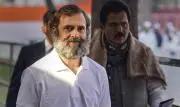Rahul had visited the memorial on September 7 for the first time ahead of the party's 'Bharat Jodo Yatra'

Rahul Gandhi. File Pic
Congress leader Rahul Gandhi will visit his late father Rajiv Gandhi's memorial in Sriperumbudur of Tamil Nadu on May 21, for the very first time on the former Prime Minister's death anniversary, said the party sources on Thursday.
ADVERTISEMENT
Earlier, Rahul had visited the memorial on September 7 for the first time ahead of the party's 'Bharat Jodo Yatra'.
Also Read: Rajiv Gandhi's death anniversary: Interesting facts about the former Prime Minister
The former prime minister was assassinated by a woman suicide bomber named Dhanu at a poll rally in Sriperumbudur in Tamil Nadu on the night of May 21, 1991. The blast killed at least 13 people and over 40 were injured.
Rajiv Gandhi took over the charge of the Congress in 1984 following the assassination of his mother and then Prime Minister Indira Gandhi. He became India's youngest Prime Minister at the age of 40 when he assumed office in October 1984.
He served as the Prime Minister of India till December 2, 1989.
Born on August 20 in 1944, Rajiv Gandhi was assassinated by a Liberation Tigers of Tamil Eelam (LTTE) suicide bomber during an election rally in Sriperumbudur in Tamil Nadu on May 21, 1991.
Rajiv Gandhi studied at Welham Prep in Dehra Dun before he moved to the iconic Doon School. He went to Trinity College in Cambridge and from there, joined Imperial College (London). Rajiv Gandhi met Sonia Gandhi at Cambridge. In 1968, they married and Sonia Gandhi moved into the house of her mother-in-law, then Prime Minister Indira Gandhi.
Upon returning to India, Rajiv Gandhi obtained a commercial pilot's licence from the Delhi Flying Club and became a pilot with Indian Airlines. He had to take on a bigger role in politics after the death of his more ambitious brother Sanjay Gandhi in a plane crash in 1980. Rajiv Gandhi contested the polls from his brother's seat Amethi. He became the president of the Indian Youth Congress in 1981.
During his tenure as Prime Minister, Rajiv Gandhi passed the anti-defection law in 1985, according to which an elected Member of Parliament could not join an opposition party till the next election.
Rajiv Gandhi is remembered as a charismatic politician who took big steps to facilitate India's IT revolution.
(With inputs from ANI)
 Subscribe today by clicking the link and stay updated with the latest news!" Click here!
Subscribe today by clicking the link and stay updated with the latest news!" Click here!







